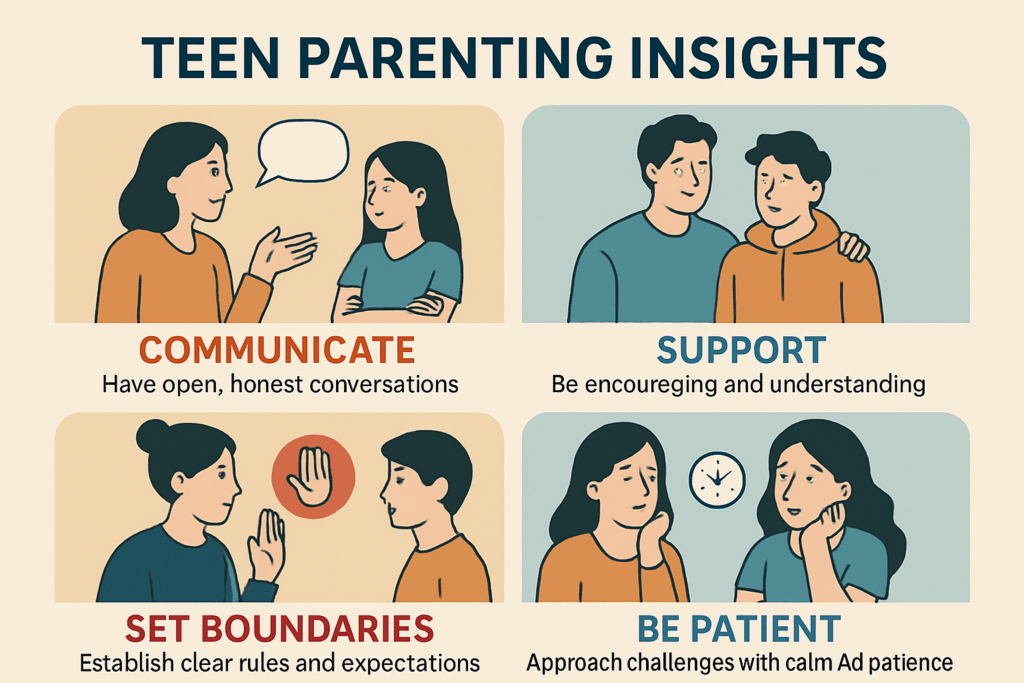Lessons Learned from Teenage Parenting Journeys
Lessons Learned from Teenage Parenting Journeys
Let’s admit it—nothing truly preps you for the mind-bending rollercoaster of guiding a teenager. Manuals, blogs, pep talks… they’re a good start, but parenting teens lays bare a whole new level of learning. Over the years, here’s what stands out after weathering curfews, slammed doors, shared laughter, and silent dinners.
First: Humility is your companion. You will mess up, sometimes spectacularly. You’ll say the wrong thing, lose your cool, apologize (a lot), and learn that admitting your own mistakes sets a powerful example. Forget being the all-knowing parent—your teen can sniff out “know-it-all” energy from a mile away. Teens want honesty, not lectures or perfection.
Second: Be a sounding board, not a fixer. If there’s one lesson we wish we had known earlier, it’s this—listen first, advice second. Most teens crave to be heard, not rescued. They want to vent, make sense of their feelings, and test their ideas out loud. Sometimes your biggest support is just quietly sitting beside them, phone down, judgment off.
Third: Flex the trust muscle—hard. Trust is currency. The more you demonstrate it (even when it feels risky), the more your teen considers you a safe harbor, not just an authority figure. Yes, sometimes trust gets broken. But rebuilding it, together, is what strengthens the bond. That’s one of those teen parenting insights you only pick up in the trenches.
Finally: Find the humor. Some days, laughter is the only thing between you and total exasperation. Teens are messy, unpredictable, and often unintentionally hilarious. Celebrate those moments. They build your resilience and remind you that raising teenagers is equal parts chaos and joy.
Bottom line? Each challenge is a lesson—and those lessons eventually become the legacy you share. You don’t have to have it all figured out. Show up, learn as you go, and lean into the wild, surprising ride.
Why Every Parent Needs Teen Parenting Insights
Here’s the truth: raising teenagers is its own beast. You might have aced toddler tantrums and homework meltdowns, but adolescence? That’s a whole new game. Emotions swing wide, opinions clash, and suddenly, your kid is part mystery and part roommate. No manual—no matter how thick—prepares you for the day your teen slams their door and says, “You just don’t get it.”
That’s why real teen parenting insights matter. They’re not tips you find to feel superior at the PTA meeting—they’re survival tools. These insights are learned by being in the trenches: figuring out how to talk so your teen actually hears you, or what to do when what worked last month flops today. You realize fast—adolescence doesn’t care about how ready you felt. The “rules” rewrite themselves, and sometimes, you just have to let go of being in control.
Still, if you stay curious and open—listening to other parents’ stories, learning what resonates, admitting what doesn’t—you’ll find wisdom that helps you navigate the chaos. Teen parenting insights aren’t guarantees. They are shared flashlights for a path most of us stumble down. And the best part? Sometimes, the journey surprises you with moments of connection and hope you never saw coming.
What Surprised Us Most: The Reality of Raising Teenagers
Raising teenagers is like moving to a new city with no map. One day you’re navigating bedtime stories and after-school snacks, the next you’re renegotiating curfews and wondering whom your kid is texting at midnight. The shift from childhood to adolescence doesn’t just come with hormones—it comes with a new kind of energy in your home you can’t quite prepare for.
Independence shows up overnight. Out of nowhere, your once-talkative kid wants closed doors, private time, and—frankly—less of you. It’s part pride, part heartbreak. You find yourself trading in play dates for group hangouts you’re not supposed to call “play dates.” Suddenly, you’re monitoring group chats and figuring out just how much privacy is healthy. Raising teenagers means letting them outgrow you, at least a little, and learning to trust they’ll circle back.
And wow, the attitude adjustments. The eye rolls could win gold medals. You realize that your clever comebacks from their grade school days don’t stand a chance now. Keeping a straight face during their sarcasm is its own sport.
There’s also the constant shuffle of friendships. One week they’re best friends; the next, you’re navigating fallout territory. It’s chaotic, but teaching them stability during these ups and downs ends up teaching you patience—and resilience—you didn’t know you needed.
Looking back? The biggest surprise about raising teenagers wasn’t the drama. It was watching them become people you’d want to know, even if they weren’t your own.
Top Teen Parenting Challenges (and What Actually Helps)
Let’s be blunt: teen parenting challenges are a league of their own. Communication can feel like you’re speaking through a wall. “How was your day?” gets you a shrug, “Fine,” or—if you’re lucky—a grunt. You start questioning your interview skills. Here’s the trick: don’t force marathon conversations. Grab the moments that come (even if it’s during a late-night snack run) and keep it casual.
Boundaries? Yes, you need them. But go in knowing your teen will test every line. Set the big ones—safety, respect, non-negotiables—then avoid policing every detail. Picking your battles keeps everyone sane. And remember, you can’t win every argument, nor should you try.
Trust is critical, and honestly, it’s a two-way street. Show them a bit of trust, and you might get some back. Check-ins are smart, but try not to confuse concern with control. If you slip up, own it. They notice.
Now, peer pressure and risk-taking are not just headlines—these things creep in fast and hard. Want to buffer your teen against them? Stay connected, even when they act like they don’t care. That silent Uber ride home or shared playlist might matter more than any lecture.
Short version: teen parenting challenges will test your patience and creativity. Keep showing up and keep adapting. Your effort matters more than perfection.
Adapting as a Parent: Insights from Real Stories
Flexibility sounds nice in theory, but it’s a practical survival skill when you’re raising teens. Every parent swears they’ll stick to the plan, set the rules, and hold firm. Then real life barges in, and you realize: No two teens (or parents) are the same, not even close. What worked last week might blow up in your face this week. Rolling with the chaos—sometimes even laughing at it—is what keeps you sane.
Truth? You will have to reinvent your parenting style. Fast. Some days, that means swapping lectures for late-night pizza and silent car rides for texts with emojis. Other days, it means holding your ground on the big stuff, no matter how loud the protest.
Consistency matters—it gives teens the stability they secretly need (and pretend to hate). But here’s the tricky bit: part of the job is letting go, inch by inch. That’s often harder for us than it is for them. There’s no perfect balance, only the daily effort to show up, learn, and adjust. The best real-life lessons? They come from talking to parents who’ve survived the wild ride before you. Need something even harder? Try adapting when you’re raising kids with extra complexity, like special needs. That’s next-level, and stories like these remind us: parenting is an improv act, and everyone’s script is different.
What Happens After Winning Millions?
Winning a life-changing lottery jackpot is every player’s dream, but few are prepared for what comes next. The sudden influx of wealth can bring excitement, but also a wave of challenges. Many winners find themselves overwhelmed by financial decisions, from managing taxes to making smart investments. Some handle it well, while others struggle with reckless spending that drains their fortune faster than expected.
The Financial Reality of Winning
Many winners face critical financial decisions almost immediately:
- Taxes and Legal Issues – A large chunk of the winnings often goes to taxes, and failing to plan can lead to legal troubles.
- Investing vs. Spending – Some winners hire financial advisors to ensure long-term security, while others spend impulsively without a plan.
- Budgeting for the Future – Without proper money management, even the biggest jackpots can disappear quickly.
A Lifestyle Overhaul
A sudden fortune changes life in more ways than one:
- Luxury Purchases – Mansions, sports cars, and extravagant vacations become instantly affordable.
- Social Pressure – Long-lost friends and distant relatives often reappear, expecting a share of the winnings.
- Privacy Challenges – Some winners struggle with unwanted media attention and public scrutiny.
While some winners embrace their new wealth openly, others choose to live discreetly to avoid pressure and expectations.
Giving Back and Creating a Legacy
For some, wealth is not just about personal luxury—it’s an opportunity to make a difference. Many winners choose to:
- Donate to charities and community projects
- Fund scholarships or support education initiatives
- Invest in businesses that create jobs and opportunities
Some lottery winners go from players to philanthropists, proving that wealth can be used to leave a lasting impact. However, not all stories end positively—many who fail to manage their winnings properly find themselves bankrupt within years.
Beyond the Myths: Teenagers Aren’t All Trouble
It’s easy to get lost in the noise—moody stereotypes, dire warnings, eye rolls galore—but here’s the thing: not all teens are trouble. In fact, sometimes they’re the ones teaching us. Don’t underestimate their insight or empathy; when you least expect it, your teenager might surprise you with an act of kindness or a perspective you never saw coming. They see things differently, notice things adults miss, and sometimes even call us out (nicely or not) when we’re wrong.
The best moments usually aren’t the big “milestones”—they’re the quick laughs over breakfast, the shared music in the car, the honest questions they ask right before bed. Celebrate those. These little connections matter—a lot. They build trust, open up conversation, and remind you both how much you’re actually on the same team.
So, yes, they’ll push limits. But many teens are quietly passionate, hardworking, and thoughtful in ways we didn’t realize at first. When you look past the clichés, you find real, interesting young adults—just waiting to be seen for who they actually are.
For More Parenting Wisdom
Here’s the truth: you’re not supposed to have all the answers. Teen parenting is a marathon—sometimes a comedy, sometimes a drama, always an improv act. Lean on what you learn from other parents, tweak what works for your unique crew, and shake off the guilt when things get rocky. Growth (yours and theirs) rarely happens in a straight line. When you want to keep sharpening your game, dive into resources like Verywell Family’s teen parenting lessons—the more tools in your belt, the better you’ll handle the next curveball. Keep going. It gets better, and you’re doing better than you think.
What Happens After Winning Millions?
Winning a life-changing lottery jackpot is every player’s dream, but the reality that follows is less straightforward. While the sudden influx of wealth can bring excitement, it also presents a wave of challenges that few winners are prepared for.
Financial Decisions
Many winners face the daunting task of making wise financial choices:
- Managing Taxes
Large lottery winnings can come with significant tax obligations, often catching winners off guard. - Investment Challenges
Deciding where to invest can be overwhelming. Some winners hire financial advisors, while others delay planning, leading to potential financial pitfalls. - Avoiding Reckless Spending
Without a sound plan, impulsive purchases can rapidly deplete even the most substantial fortunes.
Lifestyle Changes
Along with wealth, lifestyle transformations occur swiftly:
- Luxuries and Assets
Winners often indulge in luxury homes, exotic cars, and extravagant vacations. - Social Dynamics
Friends and distant relatives may resurface, seeking a share of the winnings, which can lead to tension and difficult choices. - Public Attention
Some choose a low-profile life to sidestep the attention and stress that accompany sudden wealth, while others embrace their new status.
Beyond Personal Wealth
Beyond personal gains, some winners utilize their fortune to foster positive change:
- Charitable Contributions
Philanthropy becomes a priority as winners make donations to charities and community projects. - Business and Community Investments
Many invest in businesses or initiatives that help revitalize local communities. - Educational Support
Funding scholarships or launching educational programs are common ways winners give back.
The journey post-win varies significantly. While some winners handle their newfound riches admirably, creating lasting legacies and uplifting communities, others face financial downfalls. The decisions made after such a monumental win shape not only personal futures but alter wider societal impacts as well.


 Family Activities & Lifestyle Contributor
Family Activities & Lifestyle Contributor
